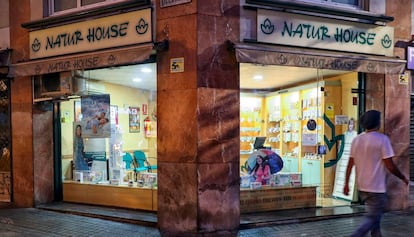Investments on hold over referendum uncertainty in Catalonia
Tensions over the illegal vote on Sunday slow projects after a record first half of the year


Political instability is slowing down investment in the Catalan economy.
Law firms say that investment funds and foreign companies have started to request legal and financial reports about the impact of the secession laws passed earlier this month by the separatist majority in the regional parliament. This legislation has been suspended by the Constitutional Court.
If large businesses had contingency plans over Brexit, what makes us think that they don’t have them now in Catalonia?
Jaime Malet, US Chamber of Commerce
Legal sources consulted by this newspaper said that some businesses have decided to put investments on hold, while others have dropped plans for investment altogether, due to uncertainty over the referendum scheduled for Sunday, and its possible consequences.
On Wednesday of last week, even as a crowd of demonstrators gathered outside the regional economy department to protest a court-ordered raid against referendum organizers, another crowd milled not 200 meters away for a store opening by the fashion giant Uniqlo.
The opening – the first by the Japanese chain store in Spain – represented yet another watershed for brand Barcelona. Besides its thriving tourism industry, the Catalan capital has recently attracted major projects by the likes of Amazon and Tesla. And foreign groups have bid for companies like Abertis, Pronovias and Mémora.
Until now, foreign capital has continued to flow into the region despite growing uncertainty over the secession plans defended by the governing Junts pel Sí (Together for Yes) coalition and their partner, the small, far-left CUP party.
There is concern, but no decisions are being made ahead of time
Antonio Duran-Sindreu, lawyer
According to Economy Ministry figures, Catalonia attracted €1.6 billion to June, a 20.6% rise from 2016.
But since early September – the secession laws were passed on September 6 and 7 – international financial institutions have been issuing warnings to potential investors. A majority of analysts at Bank of America Merrill Lynch, ING, Moody’s, JP Morgan and Goldman Sachs still see secession as a remote possibility, but they are forecasting an escalation of political tension that will make it difficult to find a solution.
Several law firms and consultants have confirmed that their clients are no longer satisfied with verbal assurances about the safety of investing in Catalonia. Three law firms said that investors, particularly foreign ones, are requesting legal reports about the consequences of the referendum, and studies on its impact on taxes, trade and labor issues.
After seeing these studies, some companies have decided to wait and see what happens, while others have opted to invest in other countries.
Economy Minister Luis de Guindos said this week that a carmaker has decided not to open up facilities in Barcelona due to the referendum, although he did not say which one.
Investors have put on the brakes when it comes to new hotels
Bruno Hallé, Magma Turismo consultancy
The uncertainty is palpable in the tourism industry. “Investors have put on the brakes when it comes to new hotels. They are not ruling them out altogether, but they want the situation to clear up,” says Bruno Hallé, of Magma Hospitality Consulting.
Kike Sarasola, chairman of the Room Mate Hotels chain, said that two new projects of his in Barcelona have ground to a halt because both foreign investors don’t want to take the risk.
Moving HQs
The employers association Fomento del Trabajo and the business lobby Círculo de Economía have not issued statements about the political situation in Catalonia. Sources at the former said that a statement will be made on Monday, and that their silence is due to the perceived need not to rattle the markets.
An official at Fomento del Trabajo said that the political climate reminds him of the regional election of September 27, 2015, which was widely viewed as a de facto ballot on independence to the extent that the Junts pel Si coalition’s main campaign promise had been to organize a referendum if it won the election.
Back then, companies like Derby Hotels and Unico Hotels moved their headquarters to Madrid, while others like Pronovias, Planeta and Indukern threatened to do so.
Investors will not shut down factories, but we could see a similar situation as Quebec, which lost decision-making centers Jaime Malet, head of the US Chamber of Commerce in Spain
So far, the only major company to announce that it is leaving Catalonia is Naturhouse. Officials cited operational reasons, but its president, Félix Revuelta, has been very critical of the Catalan government’s sovereignty plans.
Other companies have adopted a wait-and-see attitude. “There is concern, but no decisions are being made ahead of time,” says the lawyer Antonio Duran-Sindreu.
Banco Sabadell CEO Jaume Guardiola said that businesses are working on “contingency plans” in case the Yes side wins on Sunday. An executive at a major consulting group confirms this, and adds that often all it means is changing a registered office address.
“If large businesses had contingency plans over Brexit, what makes us think that they don’t have them now in Catalonia?” asks Jaime Malet, head of the US Chamber of Commerce in Spain.
Malet warns that faced with the choice of working in a dual legal system, which could entail fines, and changing their registered office address, companies will choose the latter.
“They will not shut down factories, but we could see a similar situation as Quebec, which lost decision-making centers.”
English version by Susana Urra.
Tu suscripción se está usando en otro dispositivo
¿Quieres añadir otro usuario a tu suscripción?
Si continúas leyendo en este dispositivo, no se podrá leer en el otro.
FlechaTu suscripción se está usando en otro dispositivo y solo puedes acceder a EL PAÍS desde un dispositivo a la vez.
Si quieres compartir tu cuenta, cambia tu suscripción a la modalidad Premium, así podrás añadir otro usuario. Cada uno accederá con su propia cuenta de email, lo que os permitirá personalizar vuestra experiencia en EL PAÍS.
¿Tienes una suscripción de empresa? Accede aquí para contratar más cuentas.
En el caso de no saber quién está usando tu cuenta, te recomendamos cambiar tu contraseña aquí.
Si decides continuar compartiendo tu cuenta, este mensaje se mostrará en tu dispositivo y en el de la otra persona que está usando tu cuenta de forma indefinida, afectando a tu experiencia de lectura. Puedes consultar aquí los términos y condiciones de la suscripción digital.








































